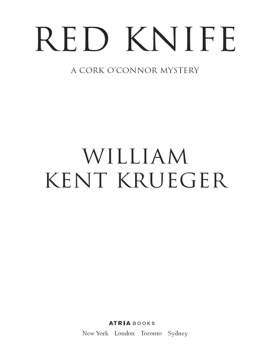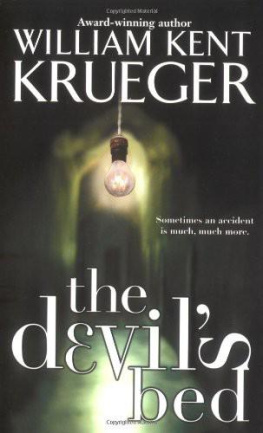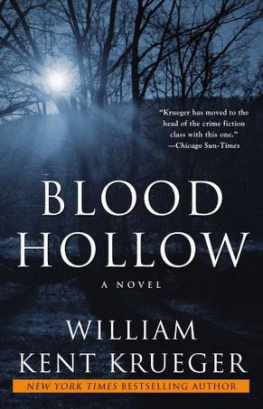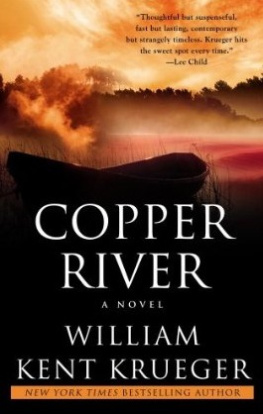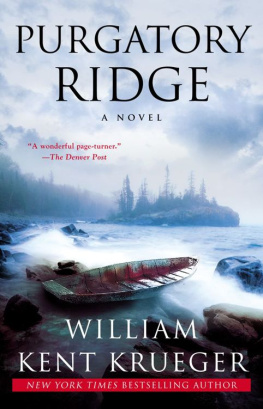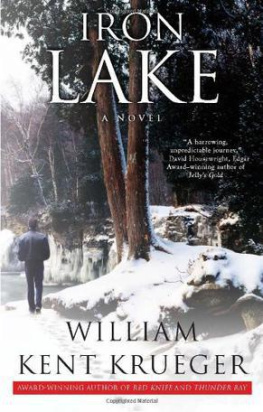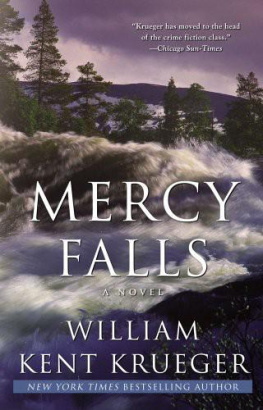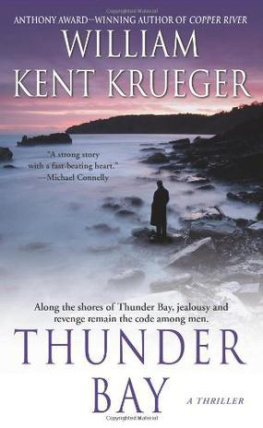ATRIA BOOKS
PROUDLY PRESENTS
NORTHWEST ANGLE
WILLIAM KENT KRUEGER
AUTHORS NOTE
O n July 3, 1999, a cluster of thunderstorms developed in the Black Hills area of South Dakota and began to track to the northeast. On the morning of July 4, something phenomenal occurred with this storm system, something monstrous. At the edge of western Minnesota, the storm clouds gathered and exploded, creating what would become one of the most destructive derechos ever to sweep across this continent.
A derecho is a unique storm system, a bow-shaped formation of towering black clouds that generate straight-line winds of hurricane force. The derecho that formed on July 4 barreled across northern Minnesota. In the early afternoon of that Independence Day, its hellish winds, clocked at over a hundred miles an hour, struck the Boundary Waters Canoe Area Wilderness, a land so beautiful its as near to heaven as youre likely to find anywhere on this earth. The storm damaged nearly half of the wilderness, toppling millions of trees, leaving whole hillsides barren of life. It killed one camper and trapped and injured dozens of others.
After it left Minnesota, the storm veered across the border into Ontario, Canada, and continued its destructive sweep to the east. It slammed into the state of New York and then into New England. It traveled out to sea, turned, and came at South Carolina. The system, though weakened, continued its destruction until it finally fell apart over the Gulf of Mexico. By then, it had traveled nearly six thousand miles, the longest storm track of its kind ever recorded in North America.
I have always known that such a storm would play a part in one of my stories. This is the story.
PROLOGUE
H e woke long before it was necessary, had wakened in this way for weeks, troubled and afraid. A dull illumination came through the houseboat window into the cabin he shared with his son. Not light exactly. More the promise of light. False dawn, Cork OConnor knew.
He threw back the thin sheet, slipped quietly from his bunk, and stepped into the long central hallway of the houseboat. The air was still, which was odd on the vast lake where they lay anchored. No sound of birds either, no early morning chatter, and that, too, was strange. He walked down the hallway, past the room where his sister-in-law and her husband slept, past the rooms of his two daughters, onto the stern deck with its swim platform. He stood at the railing, looking across water as black as engine grease. The moon hadnt set yet but was so low and wan in the western sky that what light it gave was almost useless. There were stars, so many they felt like a weight pressing down on him. East, where dawn was still more dream than reality, he could see the dimmest outline of an island against a gray that ghosted along the horizon.
He lowered his head and stared at the water.
He should have been happy. Hed planned this vacation with happiness as the goal, and not his happiness alone. Hed conceived of this family gathering, bringing close to him everyone he loved, in order to make them happy, too. They hadnt been together, all of them, in almost two years. Not since Jo had been laid to rest in the cemetery in Aurora. In his imagining, the gathering would be the ticket to finding happiness againhis and theirsand the houseboat would be the way. But like the false dawn, the trip had promised something it had yet to deliver, and day after day, he found himself waking troubled and restless.
The problem was simple. Hed always thought of his family as if they were part of a tree hed planted long ago. The tree had grown and flourished, and just being in its shade had been such a great joy. But it seemed to him that, with Jos death, the leaves had begun to fall awayhis daughters gone to lives of their own and his son soon to followand he was afraid that, no matter what he did to save it, the tree would die. An irrational fear, he knew, but there it was, pressing hard upon his heart, whispering to him darkly in these lonely moments.
He heard a loud yawn behind him. Uncertain if his face might give away his concern, he didnt turn.
Dad? his son asked from the houseboat doorway. Were going fishing, arent we?
You betcha, Stephen.
Good. Ill get dressed.
When he was alone again, Cork took a deep breath, pulled himself together, and turned from the black water to meet the day.
At his back, his fear went on whispering.
RED KNIFE
ALSO BY WILLIAM KENT KRUEGER
Thunder Bay
Copper River
Mercy Falls
Blood Hollow
The Devils Bed
Purgatory Ridge
Boundary Waters
Iron Lake

A Division of Simon & Schuster, Inc.
1230 Avenue of the Americas
New York, NY 10020
This book is a work of fiction. Names, characters, places, and incidents either are products of the authors imagination or are used fictitiously. Any resemblance to actual events or locales or persons, living or dead, is entirely coincidental.
Copyright 2008 by William Kent Krueger
All rights reserved, including the right to reproduce this book or portions thereof in any form whatsoever. For information address Atria Books Subsidiary Rights Department, 1230 Avenue of the Americas, New York, NY 10020
ATRIA BOOKS and colophon are trademarks of Simon & Schuster, Inc.
Library of Congress Cataloging-in-Publication Data
Krueger, William Kent.
Red Knife: a Cork OConnor mystery / by William Kent Krueger.
p. cm.
1. OConnor, Cork (Fictitious character)Fiction. 2. Private investigatorsMinnesotaFiction. 3. MinnesotaFiction. 4. GangsFiction. I. Title.
PS3561.R766R43 2008
813'.54dc22
2007048175
ISBN-13: 978-1-4165-8021-8
ISBN-10: 1-4165-8021-2
Visit us on the World Wide Web:
http://www.SimonSays.com
To my friends and colleagues, past and present,
in Crme de la Crime,
who have done their best to keep me honest
RED KNIFE
MISKWAA-MOOKOMAAN
(RED KNIFE)
I t was not yet dawn and already he could smell death. It came to him in the scent of the bear fat mixed with red ochre that was the war paint smeared across his face. It was in the sulfur odor of his powder horn and in the stink of his own sweat-drenched body as he bent to the stroke of his paddle. It was in the air itself, something crisp and final, as if these were the last breaths he would ever draw, and it made his nostrils burn.
In the east, the sky hinted at color, a faint flush of red. The dark lake surface around the canoes carried a suggestion of the same hue, blood mixed with the juice of blackberries. The only sound was his own breathing and the occasional liquid gurgle of water as he swept his paddle back.
His name was Diindiisi, which meant Blue Jay. He was sixteen years old. He was Anishinaabeg, one of the Original People. This was his first war party.
For years his father and the other men of his village had been preparing him for this moment. Several days earlier, theyd painted him black, a sign that in this business he was not yet initiated. The night before, theyd forced him into the bitter-cold water of the lake, where hed washed himself clean. Afterward they invited him to join in the preparations for battle. They painted their faces. Those who had the honor of doing so adorned their hair with eagle feathers, symbols of the enemies theyd slain. They attached the penasewiam, holding charms for invulnerability, to their belts or armlets or headdresses.
Now Blue Jay was among them, a warrior, his knife sharpened, his war club at hand, his flintlock cleaned and loaded. His father knelt in the stern of the birch-bark canoe. Blue Jay had the bow. He was afraid, more afraid than hed ever been. He was also excited, and the two emotions waged a battle inside him that no man looking at his face could see.

